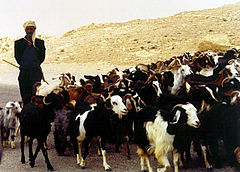| Revision as of 21:15, 4 January 2008 editCarbon Caryatid (talk | contribs)Extended confirmed users, Pending changes reviewers40,718 edits change cat to animal← Previous edit | Revision as of 19:33, 24 January 2008 edit undoEdcolins (talk | contribs)Administrators52,669 edits {{original research}}Next edit → | ||
| Line 1: | Line 1: | ||
| {{Unreferenced|date=November 2006}} | {{Unreferenced|date=November 2006}} | ||
| {{original research}} | |||
| ] ]s in ]]] | ] ]s in ]]] | ||
Revision as of 19:33, 24 January 2008
| This article does not cite any sources. Please help improve this article by adding citations to reliable sources. Unsourced material may be challenged and removed. Find sources: "Goatherd" – news · newspapers · books · scholar · JSTOR (November 2006) (Learn how and when to remove this message) |
| This article possibly contains original research. Please improve it by verifying the claims made and adding inline citations. Statements consisting only of original research should be removed. (Learn how and when to remove this message) |

A goatherd (/ˈgoʊtˌhɜrd/) or a goatherder is a person who herds goats for a living. Similar to a shepherd who tends sheep for a living, the drover here herds goats. Goatherds are popular in countries where goat populations are natively high; for instance, in Africa and South Asia. Herding a goat is much more difficult than herding sheep as, unlike sheep, goats do not have a herd mentality and each goat will tend to stray farther in search of better foliage and grass. It is for this reason that, in these areas, goats are costlier than sheep.
Fictional goatherds include Peter from Johanna Spyri's Heidi, and the song from "The Lonely Goatherd" from The Sound of Music.
The word capriculturist, which is derived from Latin, began to appear with more frequency in the late 1940s.
This job-, occupation-, or vocation-related article is a stub. You can help Misplaced Pages by expanding it. |